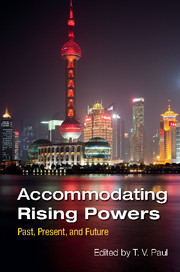Book contents
- Frontmatter
- Contents
- List of figures
- List of contributors
- Acknowledgments
- Part I Mechanisms of accommodation
- Part II Historical cases
- Part III Contemporary cases
- 10 China's bargaining strategies for a peaceful accommodation after the Cold War
- 11 Partial accommodation without conflict: India as a rising link power
- 12 Brazil: revising the status quo with soft power?
- 13 Prospects for the accommodation of a resurgent Russia
- Part IV Conclusions
- Index
12 - Brazil: revising the status quo with soft power?
from Part III - Contemporary cases
Published online by Cambridge University Press: 05 March 2016
- Frontmatter
- Contents
- List of figures
- List of contributors
- Acknowledgments
- Part I Mechanisms of accommodation
- Part II Historical cases
- Part III Contemporary cases
- 10 China's bargaining strategies for a peaceful accommodation after the Cold War
- 11 Partial accommodation without conflict: India as a rising link power
- 12 Brazil: revising the status quo with soft power?
- 13 Prospects for the accommodation of a resurgent Russia
- Part IV Conclusions
- Index
Summary
International politics are in flux, as the “unipolar moment” seems to be slipping away in the Chinese economic and military surge of the past decade and the Russian desire to contest US leadership along its periphery. Into this context, some of the larger developing nations (e.g., India, Brazil, South Africa, Indonesia, and Turkey) are increasingly clamoring for a greater role in global politics and demanding that the governance structures of the international system take more account of their own interests as those structures seek to accommodate new international realities. These developing nations are seeking more recognition of their economic importance and of what they perceive as their appropriate political clout, as well as a cohesive and greater role in the international organizations that make up the global governance structure in economics, politics, the environment, and security. Recognition and acceptance into the global governing structures would constitute “emergence.” A leadership role in a multilateral institution that has little impact on the behavior of the major players in the international order (e.g., G77) is not an indication of emergence.
In this chapter, I argue that Brazil is attempting to emerge not for the sake of overthrowing the existing international order but in order to reform its structures and revise its foundational myths. Brazil believes that if the current world order is to survive, it must incorporate more perspectives from the South, and that Brazil can represent those perspectives.
Historical constants in Brazilian aspirations allow us to proceed without paying a great deal of attention to the variations in domestic politics. This does not mean that the country is a black box internally; domestic politics play a role, but their influence has been on the margins of foreign policy, not challenging its central thrust. A vivid illustration is found in the unexpected shock of June 2013, when Brazilians protested across the country against the expense of preparations for the upcoming Olympics and World Cup. Despite these significant domestic challenges, President Dilma Rousseff still opened the General Debate of the UN General Assembly a few months later with a major international offensive against the United States’ abrogation to itself of the right to use the Internet to spy on the governments and citizens of countries posing no threat to US national security.
- Type
- Chapter
- Information
- Accommodating Rising PowersPast, Present, and Future, pp. 246 - 267Publisher: Cambridge University PressPrint publication year: 2016
- 5
- Cited by

